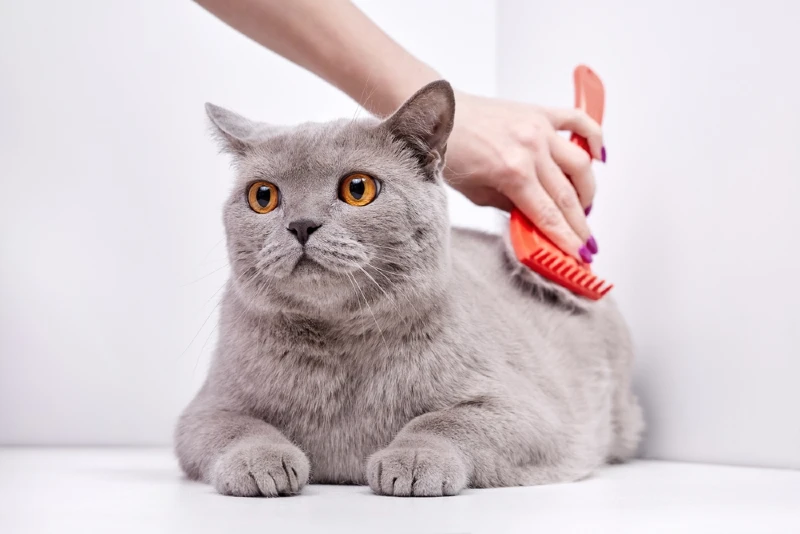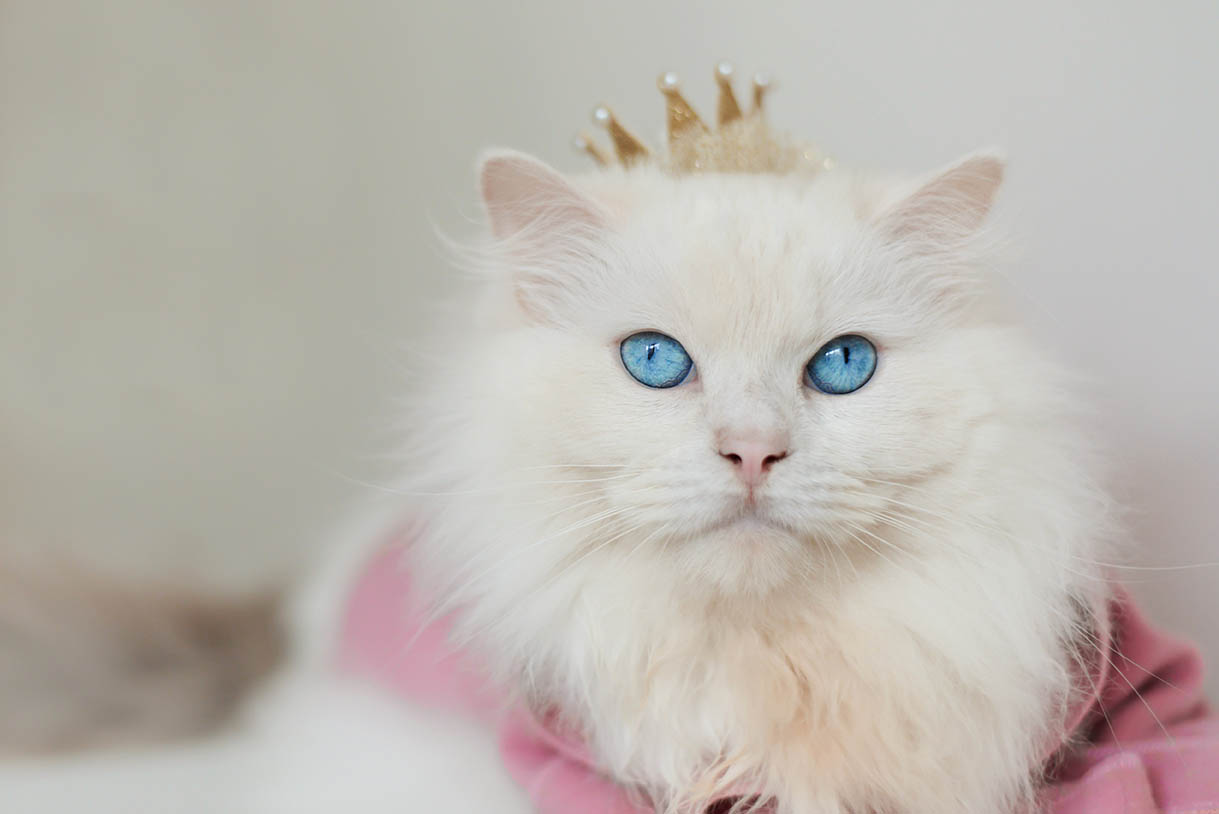What Is the Cost of Chemotherapy for Cats? 2024 Price Update
Updated on
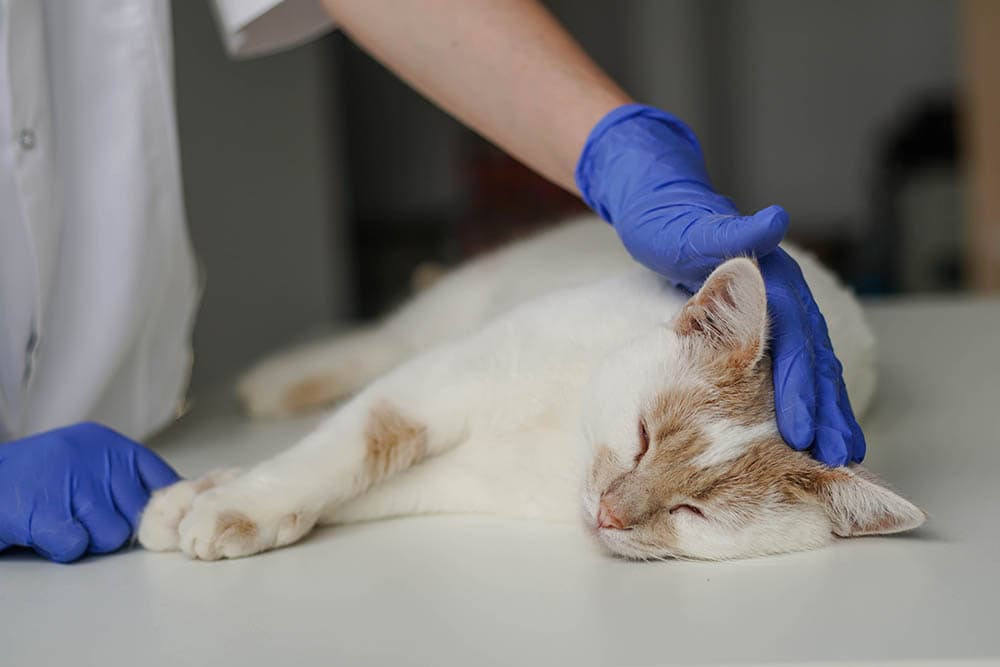
Cancer is a very scary devastating diagnosis. If your cat has just been diagnosed with this terrible disease, you want to do everything you can not only to treat it but also to make sure they are as comfortable and pain-free as possible.
One of the most common treatment options for cancer is chemotherapy, which utilizes chemical agents to kill cancer cells. There are a variety of chemotherapy drugs available that may be used alone or as a combination with other drugs and treatment options.
It’s no secret that veterinary care can be quite expensive, especially when you are dealing with a serious diagnosis like cancer. This leaves many cat owners concerned about the costs to treat their beloved companion. In general you can expect to pay $150 to $600 for each chemotherapy.
Keep reading to get a better understanding of what kind of costs you can expect with chemotherapy and cancer treatment.
The Importance of Cancer Treatment
Early detection and veterinary intervention in cases that involve cancer are very important. It’s not always easy to catch it early and even then, it doesn’t always mean a good prognosis. Early detection gives your veterinarian the best chance of extending the cat’s life and ensuring they have the best quality of life possible.
There are a variety of cancer treatment options available after your cat has been diagnosed. These options include surgery, radiation, chemotherapy, immunotherapy, and cryotherapy. There are also some alternative and holistic options such as herbal medicine, nutritional support, and acupuncture.
Your veterinarian will talk to you in-depth about your cat’s diagnosis, prognosis, and recommended treatment options. Most cancer treatment is aimed at extending the life of your cat and keeping them comfortable and free of pain for as long as possible. There are plenty of different costs associated with cancer treatment, with chemotherapy being just one piece of the puzzle.
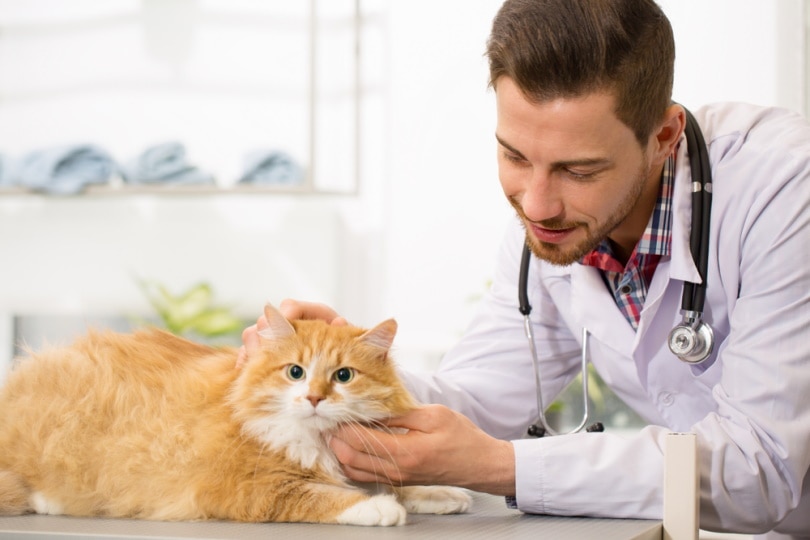
How Much Does Chemotherapy Cost?
Since chemotherapy is just one of the several cancer treatment options and may be used alone or in conjunction with other forms of treatment, the cost can vary significantly. Some factors that help determine the cost are the type of cancer, where it is located, your cat’s age and health, and whether the treatment is being used as curative or palliative.
Each dose of chemotherapy can range in cost from $150 to $600. The number of treatments needed will depend on the type of cancer, the chemotherapy protocol, and the cat’s responsiveness to the treatment. There are a few ways chemotherapy is administered, which include:
- Intramuscular injection (in the muscle)
- Intralesional injection (directly into the tumor)
- Subcutaneous injection(under the skin)
- Intravenous injection (in the vein)
- Oral medication (by mouth)
There are various protocols available, as chemotherapy can involve various drugs. The success rate and prognosis are bound to differ and your veterinarian will discuss the process in detail before you get started. The cost of chemotherapy can reach up in the thousands depending on how many doses are required.
- L-asparaginase
- Vincristine
- Cyclophosphamide
- Doxorubicin
- Prednisone
- Asparaginase
- Cytoxan
- Chlorambucil
- Methotrexate
Additional Costs to Anticipate
Cancer treatment involves much more than just chemotherapy, so you can expect some additional costs to be included in your veterinary bill for treatment. The cancer treatment process can cost thousands and has been known to reach up to $10,000 or more in some cases.
Make sure you talk to the veterinary clinic about pricing and payment options to get a better understanding of what to expect. Additional costs typically include:
Exam Fees
Veterinary clinics charge an initial examination fee regardless of whether you scheduled your appointment ahead of time, walked into the clinic, or are being seen in an emergency. Exam fees will vary by clinic and are usually a set fee that ranges anywhere from $30 to $100.
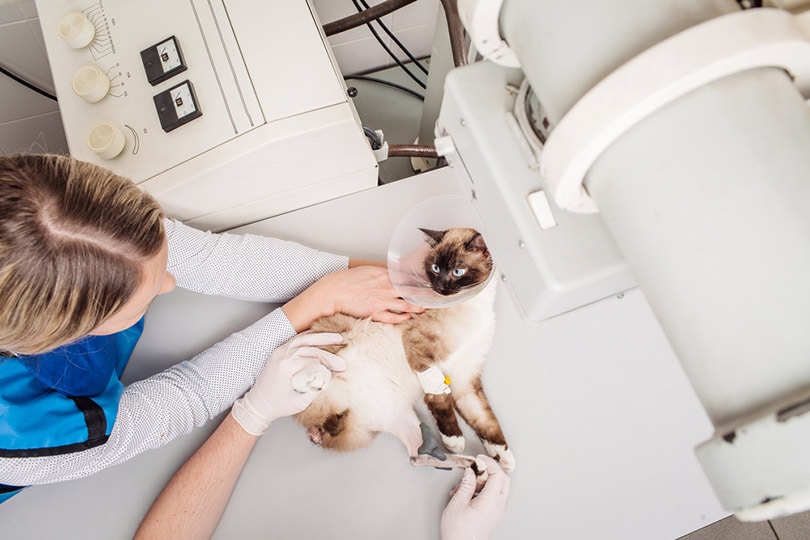
Diagnostic Testing
When the veterinarian sees your cat for any illness, diagnostic testing will need to be done. When cancer is suspected, they will do blood work and diagnostic imaging such as an X-ray or ultrasound. In some cases, veterinary specialists may be needed to perform further diagnostic testing such as MRI and CT scans.
A biopsy may also be done to help determine the tumor’s type. This is often done via a fine needle aspirate, which means a needle is inserted into the tumor to collect cells. A core biopsy may be necessary for certain circumstances, where a long hollow tube is used to remove pieces of tissue.
Additional Cancer Treatments
Chemotherapy may be done in addition to other forms of cancer treatment. Treatment protocol will depend on the type of cancer and the severity of the disease, but chemotherapy is most commonly used in conjunction with radiation therapy. Alternative, complementary treatments may also be recommended, which include immunotherapy, acupuncture, or herbal and nutritional support.
Medication
Certain medications may be used during your cat’s cancer treatment, which often includes prescription medication for pain management. The use of nerve blocks is sometimes utilized to help control cancer pain.
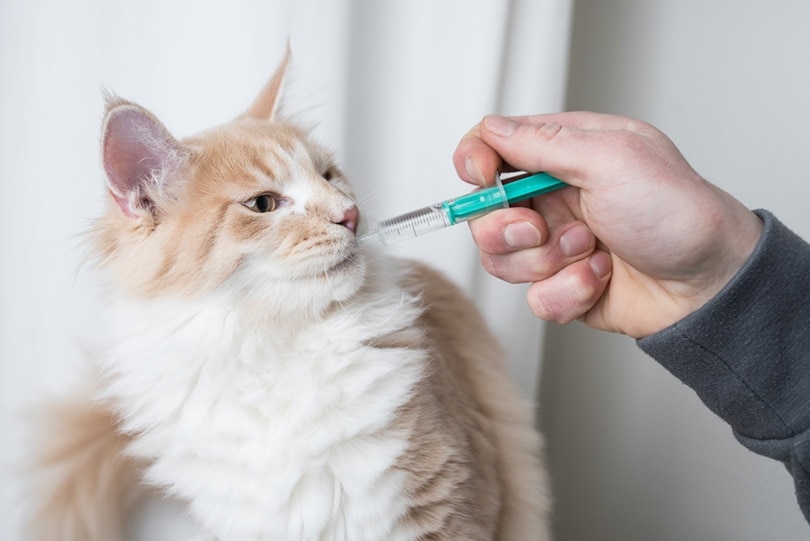
Surgery
There’s a chance your cat will need surgery at some point during their cancer treatment. This will be dependent on the type of cancer and the location and may involve either the reduction or removal of the malignant tumor.
Follow-Up Appointments
Your cat will need follow-up appointments while going through chemotherapy. Your veterinarian will discuss with you how often they need to be seen and what those visits will include. Some clinics may include follow-up appointments as part of the overall cost of cancer treatment, so it will depend on the clinic whether or not the traditional exam fee applies.
The 4 Common Cancers in Cats
Cats are susceptible to a variety of cancers, with more than 6 million cats being diagnosed with cancer every year. The most common types of cancer observed in our feline companions include:
1. Lymphoma
One of the most common feline cancers is lymphoma, which affects a type of white blood cell known as lymphocytes. Lymphocytes are found throughout the body in the lymph nodes, spleen, liver, gastrointestinal tract, and bone marrow.
Lymphoma can occur as a result of the feline leukemia virus or feline immunodeficiency virus and can affect cats of any age. In most cases, the gastrointestinal tract is the most commonly affected area of the body. Chemotherapy is the most common treatment for feline lymphoma.

2. Squamous Cell Carcinoma
Squamous cell carcinoma is a cancer of the skin cells and can occur anywhere these cells are present. This type of cancer is the most common cancer of the oral cavity in cats. Signs of squamous cell carcinoma include drooling, bad breath, bleeding, and difficulty eating. Treatment is dependent on the size and amount of tumors present. Surgical removal is the best treatment option but radiation and chemotherapy may also be recommended.
3. Fibrosarcoma
Fibrosarcoma is a type of cancer that affects the soft tissues. This cancer is slower to spread but aggressive in the area in which it is located. Physical signs of fibrosarcoma include painlessness, masses, or lumps under the skin. When cancer has advanced, there may be other signs such as weakness, lethargy, dehydration, and lack of appetite.
Surgery to remove cancer and possibly even some surrounding healthy tissue is often recommended depending on where the fibrosarcoma cancer is located. Limb amputation may be necessary in some cases. Follow-up treatment with radiation and chemotherapy may also be recommended.
4. Mammary Cancer
Mammary cancer is a common cancer that affects cats, and up to 90 percent of mammary tumors are malignant. If this cancer progresses, it may spread to the lymph nodes and lungs, so early detection is very important.
Surgical removal of the mammary tumor is the most effective treatment. In cases where the disease has progressed, chemotherapy may be recommended after surgery. It is highly recommended to have your female cat spayed before the first heat cycle to reduce the risk of feline mammary cancer.
Is Chemotherapy the Right Choice for My Cat?
The main goal of chemotherapy treatment is to extend and improve your cat’s quality of life for as long as possible. Whether chemotherapy is the right choice for your cat will depend on several factors, including the type of cancer and where the cancer is located.
Your veterinarian will discuss the diagnosis in detail and talk about all treatment options, including all information you need to know about treatment options and prognosis. The success rate of chemotherapy alone or when combined with other treatments will vary depending on the type of cancer and the individual cat.
Whether it is right for your cat will ultimately be up to you and your veterinarian.
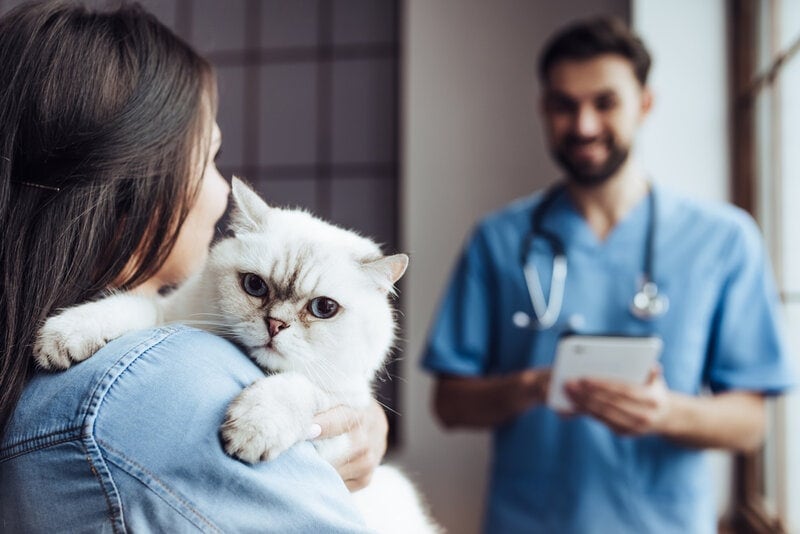
Does Pet Insurance Cover Cancer Treatment?
Most pet insurance policies will cover your cat’s chemotherapy and some other forms of cancer treatment as long as the cancer is not a pre-existing condition. Keep in mind that pet insurance companies offer different levels of coverage, and cancer treatment would not be included in an accident-only plan. It is important to understand your policy and what falls under your scope of coverage.
Keep in mind that you will need to meet your chosen deductible before the insurance company will begin paying toward treatment. Pet insurance will typically reimburse a certain percentage of what you’ve paid your vet, which is typically between 70 and 90 percent of the bill. Some pet insurance companies will pay the vet directly, while others may require you to pay them upfront and you will be reimbursed after submitting the claim.
Conclusion
The cost for a single dose of chemotherapy ranges between $150 and $600, so the overall cost of chemotherapy alone will vary depending on how many doses are needed. Since chemo is often just one piece of the puzzle that is cancer treatment, there are plenty of other costs associated with care. Pet owners can expect to spend thousands to treat cancer. Pet insurance will often cover cancer treatment costs, so it’s a nice way to relieve the financial burden. If you do not have pet insurance, you should talk to your veterinary clinic about payment or finance options that are available.
Featured Image Credit: Gleb Usovich, Shutterstock


